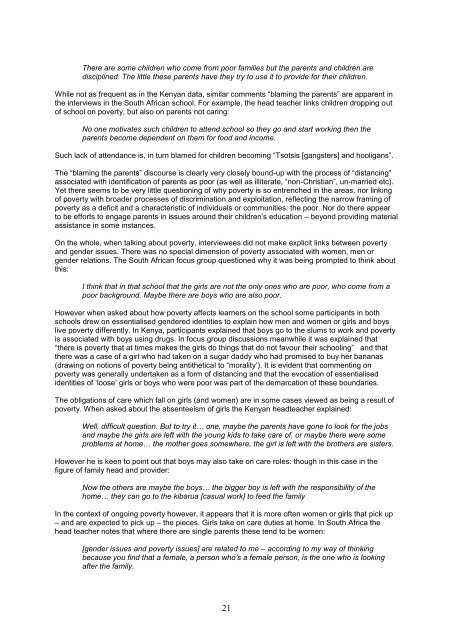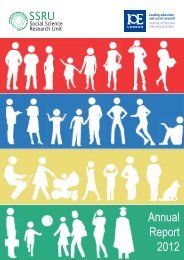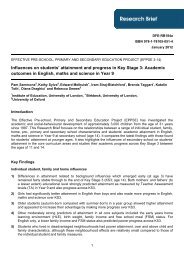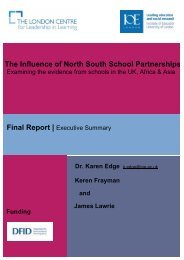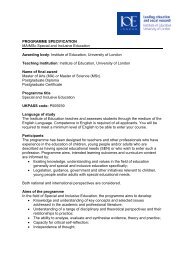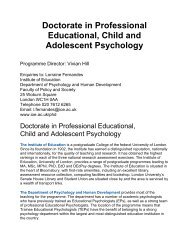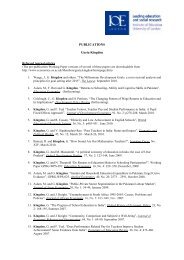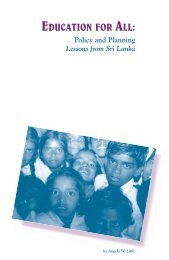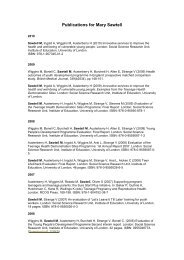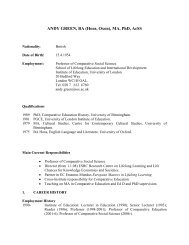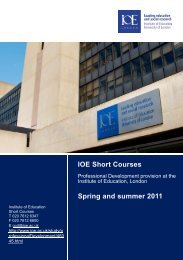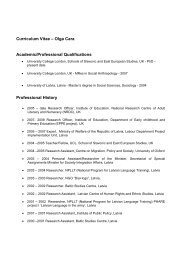Working paper 1 (pdf - Institute of Education, University of London
Working paper 1 (pdf - Institute of Education, University of London
Working paper 1 (pdf - Institute of Education, University of London
Create successful ePaper yourself
Turn your PDF publications into a flip-book with our unique Google optimized e-Paper software.
There are some children who come from poor families but the parents and children are<br />
disciplined. The little these parents have they try to use it to provide for their children.<br />
While not as frequent as in the Kenyan data, similar comments “blaming the parents” are apparent in<br />
the interviews in the South African school. For example, the head teacher links children dropping out<br />
<strong>of</strong> school on poverty, but also on parents not caring:<br />
No one motivates such children to attend school so they go and start working then the<br />
parents become dependent on them for food and income.<br />
Such lack <strong>of</strong> attendance is, in turn blamed for children becoming “Tsotsis [gangsters] and hooligans”.<br />
The “blaming the parents” discourse is clearly very closely bound-up with the process <strong>of</strong> “distancing”<br />
associated with identification <strong>of</strong> parents as poor (as well as illiterate, “non-Christian”, un-married etc).<br />
Yet there seems to be very little questioning <strong>of</strong> why poverty is so entrenched in the areas, nor linking<br />
<strong>of</strong> poverty with broader processes <strong>of</strong> discrimination and exploitation, reflecting the narrow framing <strong>of</strong><br />
poverty as a deficit and a characteristic <strong>of</strong> individuals or communities: the poor. Nor do there appear<br />
to be efforts to engage parents in issues around their children‟s education – beyond providing material<br />
assistance in some instances.<br />
On the whole, when talking about poverty, interviewees did not make explicit links between poverty<br />
and gender issues. There was no special dimension <strong>of</strong> poverty associated with women, men or<br />
gender relations. The South African focus group questioned why it was being prompted to think about<br />
this:<br />
I think that in that school that the girls are not the only ones who are poor, who come from a<br />
poor background. Maybe there are boys who are also poor.<br />
However when asked about how poverty affects learners on the school some participants in both<br />
schools drew on essentialised gendered identities to explain how men and women or girls and boys<br />
live poverty differently. In Kenya, participants explained that boys go to the slums to work and poverty<br />
is associated with boys using drugs. In focus group discussions meanwhile it was explained that<br />
“there is poverty that at times makes the girls do things that do not favour their schooling” and that<br />
there was a case <strong>of</strong> a girl who had taken on a sugar daddy who had promised to buy her bananas<br />
(drawing on notions <strong>of</strong> poverty being antithetical to “morality‟). It is evident that commenting on<br />
poverty was generally undertaken as a form <strong>of</strong> distancing and that the evocation <strong>of</strong> essentialised<br />
identities <strong>of</strong> „loose‟ girls or boys who were poor was part <strong>of</strong> the demarcation <strong>of</strong> these boundaries.<br />
The obligations <strong>of</strong> care which fall on girls (and women) are in some cases viewed as being a result <strong>of</strong><br />
poverty. When asked about the absenteeism <strong>of</strong> girls the Kenyan headteacher explained:<br />
Well, difficult question. But to try it… one, maybe the parents have gone to look for the jobs<br />
and maybe the girls are left with the young kids to take care <strong>of</strong>, or maybe there were some<br />
problems at home… the mother goes somewhere, the girl is left with the brothers are sisters.<br />
However he is keen to point out that boys may also take on care roles: though in this case in the<br />
figure <strong>of</strong> family head and provider:<br />
Now the others are maybe the boys… the bigger boy is left with the responsibility <strong>of</strong> the<br />
home… they can go to the kibarua [casual work] to feed the family<br />
In the context <strong>of</strong> ongoing poverty however, it appears that it is more <strong>of</strong>ten women or girls that pick up<br />
– and are expected to pick up – the pieces. Girls take on care duties at home. In South Africa the<br />
head teacher notes that where there are single parents these tend to be women:<br />
[gender issues and poverty issues] are related to me – according to my way <strong>of</strong> thinking<br />
because you find that a female, a person who‟s a female person, is the one who is looking<br />
after the family.<br />
21


